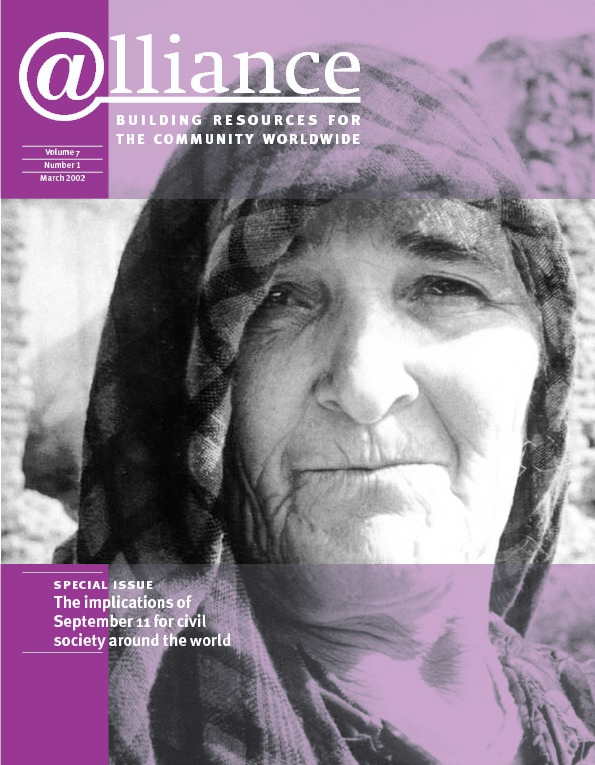How can an organization committed to civil society values present itself as a source of ‘impartial’ reporting? OneWorld is a leading human rights and development portal that has been balancing life as a non-profit NGO and online media organization since 1995. Last year it asked itself this difficult question and set out to develop a new set of editorial standards.
The understandable fear is that any explicit departure from strict journalistic standards of fairness and impartiality will lead to a weakening of trust in civil society communications.
Transparency rather than impartiality
But this need not happen if transparency of process is prioritized, argues Sebastian Naidoo, International News Editor for OneWorld’s main portal, OneWorld.net, and its news syndication service, presently appearing on Yahoo.com.[1] ‘It’s important to state the difference between values of selection and values of reporting,’ explains Naidoo. ‘We are completely transparent about both. Yes, we choose to select only stories that are concerned with human rights, sustainable development and the environment, and we also choose to ensure maximum standards of accuracy and fairness in reporting.’
Larry Kirkman, Dean of the School of Communication at the American University in Washington DC and a OneWorld trustee, agrees that transparency rather than impartiality is the key to the new editorial approach. ‘It’s important to be as transparent as possible in representing the advocacy positions, the voices, the opinions, the commentary,’ says Kirkman. He also stresses the importance of presenting both sides of a debate.
‘In our reporting of events, of debates and arguments, I think it’s worth representing the opposition as strongly as we can. We have to feel confident that we can in fact take on the toughest opposition, and we will earn trust if we can show that. People will say that the opposition has enormous resources to make their case. Well, we have a lot more on our side. First, we’re right. We have people and networks, we have a struggle that we believe in. We can afford to listen and to show the full context of the global debate around the key issues.’
Formulating new standards
In 2001 OneWorld received funding from the Ford Foundation to explore and formulate the most appropriate editorial standards for NGOs and civil society groups operating on the Internet. A recent survey had suggested that 70 per cent of the American public feel that ‘you have to question the truthfulness of most things you read on the Internet’.[2] There appeared to be a great deal of unease, in the US especially, about the growth of ‘journalism as advocacy’, which many saw as a negative side-effect of the seemingly ungovernable Internet and email communications mediums. In this context, civil society organizations were losing ground to the already established corporate brands – CNN saw a rise of 141 per cent for its news coverage post September 11 – while TV grew its position as favourite medium. The news events of late 2001 have brought further scrutiny to the fine line between advocacy and ‘values-based journalism’
To formulate an editorial policy, OneWorld drew on expertise from South and North. It included journalists from ten countries, leading experts from the BBC, and press freedom organizations such as Index on Censorship and the Freedom Forum, and proposed a set of principles for agreement by its ten international centres. The resulting 23-point standards document[3] addresses common issues such as privacy and independence, but – and this is what John Owen of the Freedom Forum classed as ‘distinct’ – it also makes explicit the fact that its content, including its creation of traditional news stories, is ‘values-based’. As mentioned above, transparency is crucial here. The new standards state that OneWorld will always indicate clearly the source of material presented as news and the identity of those who produce opinion and analysis.
Kirkman sees the new approach to journalism and editorial policy as an important step towards a transparent and ethical media culture.
‘There are great challenges for us in developing an editorial position that brings out the knowledge that’s embedded in civil society, which has the purpose of solving social problems, and supporting the poor and the struggles to end poverty. At the same time it’s very important that we use the standards and values of journalism in order to deserve and hold the trust of our audiences.’
This vision of a new type of journalism has not been restricted to NGOs operating on the Internet. Traditional mediums are beginning to recognize that the role of the ‘impartial’ journalist is changing. ‘Newspapers have finally gotten the message that the press too often emphasizes conflict and controversy to the exclusion of explanatory and public service journalism,’ explains Jack Nelson, chairman of the Pew Center for Civic Journalism, which recently conducted a survey of the editorial policy of every US newspaper with a circulation of over 20,000.
OneWorld has positioned itself at the frontline of these editorial experiments in transparency and ‘values-based journalism’. Its reputation as an organization that reports on the work of its 1,000 partners in a fair and unbiased way will be tested in the coming year.
1 Visit http://dailynews.yahoo.com/h/wl/oneworld/?u
2 Study by the US-based Markle Foundation published in July 2001. See http://www.markle.org/news/_news_pressrelease_071001.stm
3 These OneWorld Editorial Standards were accepted by the OneWorld International Foundation Board of Trustees on 1 November 2001.
Alex Lockwood is Content Manager at OneWorld International. He can be contacted at alex.lockwood@oneworld.net
To see the OneWorld Editorial Principles, go to http://www.oneworld.net/about/principles/editorial.shtml



Comments (0)